|
|
|
Sort Order |
|
|
|
Items / Page
|
|
|
|
|
|
|
| Srl | Item |
| 1 |
ID:
149494


|
|
|
|
|
| Summary/Abstract |
This article conceptualises the institutional narrative of the reconstruction of Stari Most (Old Bridge), regarded as an international symbol of reconciliation in Mostar, Bosnia–Herzegovina, as a staged reconciliation of the city. Constructed during Ottoman occupation Stari Most became a signifier of Mostar and was central to the growth of the city. Stari Most was destroyed in 1993 during the Bosnian war; restoration began five years following, and the bridge alongside Stari Grad (Old Town) was reopened as a United Nations Educational, Scientific and Cultural Organization (UNESCO) heritage site in 2004. UNESCO began operating in 1945 on the grounds that ‘peace must be established on the basis of humanity’s moral and intellectual solidarity’, based on a collaborative effort to celebrate diversity and innovation. In this article I conceptualise Stari Most as a stage of memory through identifying, firstly, the institutional staging of the reconstruction as a structure which ‘bridges’ divides, and secondly, the institutional narrative of the bridge as a symbolically reconciling structure, in a city which remains divided.
|
|
|
|
|
|
|
|
|
|
|
|
|
|
|
|
| 2 |
ID:
149498
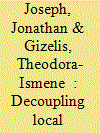

|
|
|
|
|
| Summary/Abstract |
Civil society organizations and grassroots groups are often unable to play an active role in post-conflict reconstruction and peacebuilding. A possible explanation for the observed challenges in peacebuilding is the gap or decoupling between international expectations and norms from practical action, local norms and capacities. External actors are often overly instrumental and operate according to a general template that fails to start from what the local capacities might actually be. This often leads to the decoupling of general values from practical action, which helps account for the observed barriers of engaging local civil and community organizations in reconstruction. We examine the different types of decoupling and the challenges these present. We evaluate our general theoretical argument using evidence based on the experiences of Liberian women’s civil society organizations. Given the compliance of the Liberian government with international norms, we should expect external actors to have an easier task in incorporating civil society and women’s organizations in the post-conflict reconstruction process; yet, the record appears to be the opposite. While we present the ‘tragic’ aspect of this relationship between international norms and local practice, we also suggest opportunities for ‘hybrid’ alternatives.
|
|
|
|
|
|
|
|
|
|
|
|
|
|
|
|
| 3 |
ID:
149492
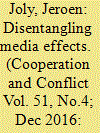

|
|
|
|
|
| Summary/Abstract |
Whether and how media are able to influence policy and the political decision-making process is still the topic of much debate. However, if news media are indeed able to influence policy, they are commonly believed to do so indirectly through their agenda-setting function – by getting issues onto the political agenda after sudden peaks of attention. Yet, despite the assertion of agenda-setting theory that policy changes occur mainly through steady advocacy of policy alternatives, little attention has been paid to the long-term effects of media exposure. The analysis of emergency assistance in Belgium from 2000–2008 shows that short-term and long-term media attention to specific countries affect decision-making in quite different ways. This study reveals different ways in which media attention can impact policymaking, as short-term attention mainly determines which countries receive assistance, while long-term attention affects the amount of assistance granted.
|
|
|
|
|
|
|
|
|
|
|
|
|
|
|
|
| 4 |
ID:
149491
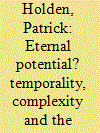

|
|
|
|
|
| Summary/Abstract |
Temporality is a relatively under-explored factor in international relations. The concept of timescape refers to the temporal timeframe of institutional processes and/or the timeframes of causation at different levels. Said concept has powerful explanatory potential in the case of complex, fragmented entities such as the European Union (EU). Critical realism offers a historicist meta-theoretical framework for delineating and analysing timescapes of different forms. Theories of critical political economy and historical sociology can be used to critique the EU’s own liberal teleological timescapes. The Union’s leadership postulates a central future role for it, based on its long-term structural relationships, and its Mediterranean policy is a prime example of this structural foreign policy. However, its component structures are profoundly dissonant and unlikely to coalesce into a meaningful role. The EU’s engagement in the Mediterranean illustrates how its long-term approach is over-ridden by the ‘real-time’ agency of other actors, and by deeper socio-economic cycles which it cannot control. A focus on temporality thus helps to interpret and explain the fragmented power of the EU; as well as our complex international system more generally.
|
|
|
|
|
|
|
|
|
|
|
|
|
|
|
|
| 5 |
ID:
149493
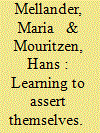

|
|
|
|
|
| Summary/Abstract |
By measuring foreign policy assertion, we document that Danish and Swedish Russia policies have fluctuated widely in the 21st century, as well as in relation to each other. Specifically, big assertion leaps took place in 2002 (Denmark) and 2008 (Sweden). Having conceptualised and operationalised small state assertion, we proceed to the explanation of these leaps. The same factor turns out to be the efficient explanation in both cases: an individual policy-maker’s so-called ‘lesson of the past’ – what he believes ‘history teaches us’. It is shown how existing theory of lessons of the past can contribute to the understanding of small state assertion in asymmetrical dyads, but only if the proper permissive circumstances are identified. First and foremost these amount to the presence of a reasonable foreign policy action space.
|
|
|
|
|
|
|
|
|
|
|
|
|
|
|
|
| 6 |
ID:
149496
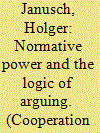

|
|
|
|
|
| Summary/Abstract |
The concept of Europe as a normative power can be understood as a theoretical attempt to define a new type of protagonist in world politics, distinct from older concepts such as empire, hegemonic power, or great power. Because many scholars have used universal norms as a criterion for ‘normative power Europe’, the concept is often criticized as hidden Eurocentrism, soft imperialism, or hegemony. In this article, a normative power is defined not by the universality of the norms it seeks to diffuse, but by the underlying logic according to which it acts. A normative power takes communicative actions and acts in accordance with the logic of arguing, not consequentialism. This definition of normative power escapes the trap of a hidden Eurocentric imperialism by abstracting the theoretical concept from the specific case of Europe and detaching it from the criterion of universal norms.
|
|
|
|
|
|
|
|
|
|
|
|
|
|
|
|
| 7 |
ID:
149497
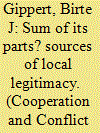

|
|
|
|
|
| Summary/Abstract |
The article analyses the sources of local actors’ legitimacy perceptions towards international peacebuilding operations. Local legitimacy perceptions are increasingly recognised as shaping local behaviour towards international peacebuilding, which influences the effective functioning of the operation. Legitimacy debates in peacebuilding are either absent or imported from the literature on domestic legitimacy, without respect to the specific temporal and spatial situation of international operations. The article first explores which legitimacy sources influence local legitimacy perceptions of international peacebuilding operations. It finds that two sources are relevant: output and procedure. Second, it investigates how exactly legitimacy arises from them. In doing so, it demonstrates that output and procedure are umbrella terms comprising several sub-elements which influence legitimacy in different, sometimes contradictory, ways. Finally, the article empirically explores which of the sources are important to local actors’ legitimacy perceptions using field data from the EU peacebuilding operations EULEX in Kosovo and EUPM Bosnia-Herzegovina.
|
|
|
|
|
|
|
|
|
|
|
|
|
|
|
|
| 8 |
ID:
149495
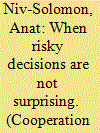

|
|
|
|
|
| Summary/Abstract |
On 12 July 2006, Hezbollah operatives crossed into Israel and attacked a military patrol, killing three soldiers and kidnapping two more. In retaliation to this incident Israel launched a military operation that resulted in 34 days of fighting between Hezbollah and Israel. The Israeli retaliation has been deemed to be severe and surprising. Furthermore, a public investigation commission established by the Israeli government implicated key decision-makers, and especially Prime Minister Olmert, as guilty of hasty and irresponsible decision-making. This article views this case through the lens of prospect theory, showing how the decision was made at the framing stage, and suggesting that this decision was not hasty but, rather, was consistent with the logic of loss-aversion.
|
|
|
|
|
|
|
|
|
|
|
|
|
|
|
|
|
|
|
|
|